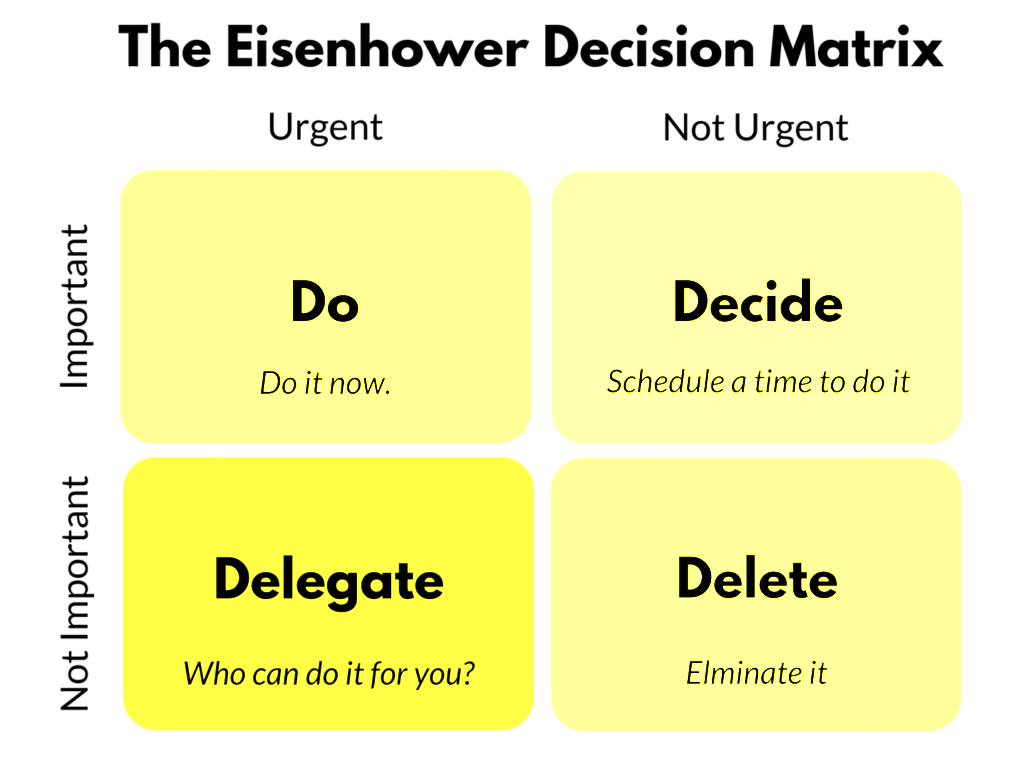Use these time management strategies to hack your time and become more efficient!
Time is your most valuable currency. If you’re not careful, hours, days, weeks, months, and years can sneak right by you. On the other hand, if you learn to account for your time, you can win big in life.
How you spend your time is an integral component of your progress, professional or personal. So decide to make every day count and ensure you add value to your existence.
Most of us struggle with time management. However, you can learn some very practical tips and tricks to manage your time intelligently.
Investing in time management strategies, as we share with you in this blog, will help you attain your goals without compromising on your well-being. Let’s explore some tried and tested methods to help you achieve efficiency and strike a perfect work-life balance.
1. Learn to Say No

Do you find yourself saying ‘yes’ when you want to say ‘no’?
It could be something as simple as saying yes to a late-night hangout on a weekday with friends when you know you have an important meeting early the next morning. Or it could be taking more tasks on your plate when you know you have your hands full already.
It’s only human to want to fit in, please others, and get their approval. However, saying yes when you should say no is costly behavior that compromises and impedes your success.
It’s time that you set clear boundaries in place and know when to say no. Stand your ground and be clear about your priorities. Never let unnecessary things that aren’t even your responsibility detract you from your important work.
Cultivate the vital skill of saying no. Trust us; it does wonders for your efficiency at work and in your personal and social life.
Only agree to tasks that you can handle in reality without compromising your workflow. If you are already occupied with work and receive additional requests for the same day, it is advisable to say “NO.”
It’s great to help others out from time to time. However, doing so at the cost of your own work leads to missed deadlines, poor work quality, and resentment toward the person who made undue demands on you. Help others when you have completed your work or you have some extra time to spare. Always try to keep your priorities simple and straight.
2. Think of the Big Picture

To optimize your success, you must have a long-term vision.
Life is not about thinking only of the present day. Rather, it is about looking at the big picture and taking proactive decisions to guarantee future growth. Some aspects might look unimportant to you today. However, they can acquire greater importance down the line.
The trick is to research, study and identify the tools and frameworks to ensure your longevity and sustained success in the market. This is the cornerstone of efficiency, where you make contingency plans and have a forward-looking vision.
Think of big names like Kodak, Nokia, and Blockbuster. Big sharks of their respective industries that couldn’t retain their position as market giants and, in some instances, went completely under. The common denominator is that they stuck to traditional ways of working and failed to innovate.
To be efficient, start looking at the big picture. Incorporate modern methods into your operations as soon as you can. One way to do this is by using advanced technology like Week Plan, which comprehensively upgrades your task and time management systems.
Assess the long-term benefits of your work systems and begin using technology today to ensure you don’t fall behind and continue to grow.
3. Align Your Focus

Staying focused is one the most successful and proven time management strategies that helps you in the short term and the long run.
Adopt effective focusing techniques such as putting away your phone, calendar blocking, and preparing a task list. This will give you clarity about your work process and also remove distractions from your mind.
When you have a clear destination in mind, with the steps along the way also broken down into doable chunks, you can push yourself forward with more motivation.
Staying focused is the key to keeping yourself on track. Dedicating focused time to specific tasks enhances productivity and efficiency. It helps you complete tasks that are important and require your utmost attention. To stay put on what you want to achieve, keep your end goals in mind. Try restricting your focus to only one part of the work at a time.
This means that when you’re working, you should not be paying attention to what’s trending on social media and where your friends plan to hang out over the weekend. Leave all that for later. In the present moment, concentrate on your projects and get them done in the best way possible.
4. Learn the 80-20 Rule

If you haven’t learned the 80-20 rule yet, it is high time that you did! Also called the Pareto Principle, this rule gives you a clear-cut idea of your efficiency.
So, what’s the logic behind this rule of 80-20?
The 80-20 rule tells us that eighty percent of the results that you achieve come from twenty percent of the efforts you put in.
When it comes to effective time management strategies, this rule suggests you find ways to keep your to-do list simple and to the point. The 80-20 rule also encourages you to always get down to the most important tasks first and focus on completing them before working on unimportant aspects. Different methods of prioritizing tasks, such as the Eisenhower Matrix or ABC analysis, can help you plan ahead and focus on one task at a time to enhance productivity.
Knowing this rule helps you identify the urgent and important tasks. You can then channel your energies toward their completion. Track your time and finish those tasks within deadlines to obtain maximum value from your hard work.
5. Plan Your Work

How do you begin your work? Do you just dive right into things? Or do you take your time to assess your tasks before beginning to work?
A golden rule of high efficiency is to know each task’s importance, urgency, and nature before you start. Prepare a to-do list and rank your work according to priority. Find out the requirements of each task and then begin investing energy and time into it.
There are many ways to help you organize your work schedule in the best way possible. Project management software and structured phases in organizing tasks are crucial for effective task prioritization and team collaboration. Try smart tools like Week Plan’s Work Planner designed to help you and your team stay on track with your projects. You can view your tasks, projects, and timelines. You can also integrate them on a single platform; this will bring you and your team on board with each other, with minimal room left for confusion.
You can choose to work on the premise of priority. Use specific techniques to allot your time according to your tasks per their priority level, so you never miss out on important things.
Keep it clean and simple by planning things out in advance. This will help you as well as your team accelerate the workflow.
6. Use Effective Communication Strategies

The best way to get things done is to provide clear instructions. However, many individuals and team leaders fail to recognize the importance of effective communication.
To increase overall efficiency, revamp your communication methods. After all, it’s the hallmark of the modern world! We no longer rely on telegrams or letters to convey our thoughts to others. Rather, we opt for modern solutions such as instant messaging and emails.
So, incorporate technology to unblock communication at your workplace, especially if you operate within a digital workplace.
Furthermore, understand that communication is two-way - it is not just speaking but also listening. So, adopt some smart practices to ensure that your team’s communication remains clear and productive.
Listen to your team’s concerns and become open to constructive criticism. Integrate improvements in your work systems based on employee feedback. This will cement cooperation and coordination between people, thereby increasing overall efficiency.
7. Focus on High-value Activities

Before hopping onto something new, always identify the activity that you think will positively affect your project, team, and clients if you decide to deal with it instantly.
Always try to resist the temptation to focus on smaller, unimportant tasks that will not help you progress. To make the right decisions when it comes to tasks and time management, you must use your skills to assess the importance of each task.
Suppose you have two projects that have the same deadline. Task A is easy to do, while Task B is hard. On the other hand, Task B has a bigger payoff. Which one will you pick first?
Most people are likely to choose Task A only because it is easier. However, a wiser decision would be choosing Task B, focusing on it completely, and finishing it first. The reason is that the task might be more complicated, but it also has high stakes and, ultimately, greater reward. It’s always better to do first what gives you more returns.
You might get sidetracked but resist the urge to give in to it. The best practice is to start with what’s most important. Building a reward system for completed tasks can serve as motivation to overcome procrastination. Start by asking the following:
- What is most needed out of me by the client or by my team right now?
- What will be the consequences of not completing the task?
- How can I strategically plan for a better tomorrow?
- What is the biggest contribution I can make?
8. Use the Eisenhower Matrix for Prioritizing Tasks

The Eisenhower Matrix is a simple but powerful tool to identify your priorities. Also known as the Urgent-Important Matrix, it helps you sort through the piles of work you have and put them on your to-do list based solely on their priority level.
How can you use an Eisenhower Decision Matrix?
Well, draw a square and divide it into four boxes. Along the x-axis, you are to put the labels ‘not urgent’ and ‘urgent.’ Along the y-axis, label the boxes as ‘important’ and ‘not important.’
You will now have four categories to sort all your tasks into:
- Urgent and important
- Not urgent but important
- Not important but urgent
- Neither urgent nor important
With this clear distinction between all your tasks, you can focus solely on work per its priority. You can either perform a task yourself if it’s critical. On the other hand, if it does not require your special attention, you can delegate it as well.
This quick but powerful strategy will do wonders for your efficiency.
9. Decide Between Quality and Quantity

Research conducted by Behance found out that when you place importance on hours and physical presence over results and actions, you inevitably lead yourself down a road of anxiety. Not only that, but you also breed a culture of inefficiency.
Some people believe just sitting at their desk, slaving away for eight or nine shift hours, is enough. However, you’d be surprised by how little they achieve even after a full day’s work.
Being efficient means that you choose quantity over quality. And yes, this applies to your time management too! Instead of dedicating hours and hours to a trivial task, try focusing on important tasks and getting them done.
If you spend too much time sitting at your desk, it would promise nothing but a factory-like culture, where basic laws of human nature and idea generation are ignored.
The study mentioned above also concluded:
- If the brain is tired, it does not work effectively.
- The idea generation happens on its own terms.
- When you are forced to do more than your capacity, you start hating what you do.
The best you can do to master this effective time management strategy is to think about how much you can accomplish in a given period.
As we explained above, one of the most successful ways to do this is by creating a list of jobs that you could complete during the course of the day. Find out what keeps you motivated versus what keeps you busy. Modify your approach to work accordingly.
10. Practise Deep Work
This directly relates to the point we discussed above. You might have experienced extremely hectic days with packed schedules, only to end them with few or no milestones achieved.
So, where do the hours fly, and why do you accomplish little meaningful work?
This is a pitfall that deep work, an excellent efficiency tip, can rescue you from.
What is deep work? Well, Cal Newport came up with this concept. He defines it as “professional activities performed in a state of distraction-free concentration that push your cognitive capabilities to their limits.”
As the name suggests, deep working is all about diving below the surface and exploring the full length, breadth, and depth of a task.
Most of us are caught in the trap of doing shallow work. We are pressed for time. And so, we can’t find the space to investigate a task in detail, learn its ins and outs, and do quality work.
However, when you adopt the strategy of deep work, you commit to sharpening your focus in the face of relentless distractions. You make yourself unavailable to every other thing that demands your attention, and you concentrate completely on the particular task at hand.
This leads to excellent work quality. It also induces calmness and gives you a sense of accomplishment as you invest yourself fully into a project and obtain maximum value from it.
Come to think of it; deep work is the exact opposite of ‘look busy, do nothing’! It’s a practice that would enhance your efficiency and make you stand out.
11. Batch Your Tasks

Do you often find yourself hassled at work? Are you running behind deadlines and under a lot of pressure? Many people experience this and complain of decreased efficiency. However, they don’t know a way out.
To avoid jumping all over the place with your task management, try to batch similar tasks together before you start working on them.
Batching is one of the most effective time management and productivity hacks experts recommend today. This strategy comes with multiple benefits.
First, it helps you minimize the cost of switching between two completely different tasks. Second, it keeps you in the flow of work and does not break the momentum. Third, it helps minimize distractions so that you can complete all your tasks efficiently without compromising on their quality.
An example of batching similar tasks is taking care of your communication all at the same time. Block three slots at different time instances. For instance, you can use these time slots to check your email, social media messages (if you run your operations online) and hold meetings at your organization.
Another approach can be batching some tasks according to days. For instance, reserve only Tuesdays for meetings and progress reporting. This leaves the rest of the workweek free to get other work done.
You can get tasks of a similar nature out of your way in one go while also ensuring you don’t miss out on anything.
12. Multitasking is Not the Key

We won’t recommend you to keep yourself occupied with more than one thing at a time. Channel all your energy to one task before switching over to the next.
Multitasking might be harmless when it comes to things other than work. However, when it comes to your professional tasks, juggling several balls at once can become a quick and certain recipe for disaster.
It’s true that the human brain can’t do more than one thing at a time - well, it can but not very well. So, when you multitask, you end up compromising on your quality of work because your attention is divided instead of focused.
Though many people attempt multitasking because they think it gets more done in less time, it ironically leads to more wasted time. You might end up doing a botched job and find yourself forced to re-do tasks. This ultimately costs you time and energy.
To increase your efficiency at work, quit wasting time by focusing or trying to complete too many things at once. Concentrate on the task on hand, complete it, and then move on to the next task on your to-do list.
13. Know Where to Spend Your Time

Nearly all the time management strategies have one thing in common: they all tell you how to use your time efficiently. You can’t get more than 24 hours in one day. You can’t carry over today’s time into the next day or the week. All the time you have is what is in your hands right now.
Since time is your most important asset, learn to spend it wisely. Find out which task deserves your energy. Also, figure out the length of time it would take you to get a particular task done, and then make sure to finish it within the projected timeline. This will enable you to complete the tasks on your list without running behind on your deadlines.
You can easily keep track of your time once you are able to define how you allocate and spend your time clearly. If you want to improve how you and your teams spend time on the work, try using Week Plan. You can manage your time on a weekly or monthly basis, depending on the nature of your work.
The trick is to know which tasks to do yourself and which ones to delegate. This will make your job that much easier and more productive.
14. Automate Recurring Tasks

You perform many actions daily which is a matter of routine. They do not bring you results or add to your productivity. However, you continue to do them mindlessly, without realizing they waste your time and sap you of your energy.
Here’s a modern solution to deal with repetitive tasks: automate them!
Once you automate your recurring tasks, you will begin to see just how time-consuming and counterproductive they really were. Automate such tasks as sending out routine emails, responses to generic queries, system maintenance, or document submissions.
None of these areas (and others like them) require your specific attention. You can easily get them done using smart features offered by online apps.
You can assign tasks on a daily, weekly, monthly, or even yearly basis without preparing a new schedule every time. You can also automate task delegation and set the frequency of each task as well.
It’s a very effective way to save your time, prevent delays and decrease frustrations in the work process.
15. Set Deadlines

According to Parkinson, “Work expands to fill the time available for completion.” Another useful saying on the subject is by Napoleon Hill, who rightly asserted, “A goal is a dream with a deadline.”
Give yourself deadlines to get a professional or personal project done and see yourself achieving milestones quicker than ever before.
By setting deadlines or time limits to a task, you encourage yourself to get in the flow of work. This activity also inculcates self-discipline in you. As a result, you begin to focus your energies on what’s important and try your best to make the most of your available hours.
On the other hand, you might lose focus when you don’t have a defined deadline for tasks you are responsible for. You might end up consuming all the time you have and still not finish the work. This can leave you feeling unaccomplished and unfulfilled at the end of the day, sapping your motivation.
Setting an appropriate deadline will push you to beat the ticking clock.
16. Use the 1-minute rule

Happiness expert and author Gretchen Rubin have devised a rule to make your life easier. The simple concept is called the 1-minute rule.
The rule explains that if you have a pile of tasks and some of them can be completed in under 60 seconds, then just go about doing it and don’t waste time thinking about them.
The author explains that when he embraced this rule, he was able to achieve big results. You can do the same to replicate his success. How?
Well, this golden rule will empower you to limit the small tasks that otherwise nag you all through the day. You can assess the trivial work you have to get done and bring them completely under your control. This will ultimately resolve your feelings of overwhelm and unnecessary stress, leaving you to fully focus on the important work.
17. Be Positive

Being in a good headspace is important for efficiency.
If you approach your work with a positive mindset, you can actually get more things done in less time. At the same time, you remain happy and satisfied. One of the keystones is learning how to cope with work-related stress in a healthy way.
Share positive vibes at work and cultivate good work relationships with your coworkers. This leads to a healthier work environment where you feel motivated to achieve more each day. The right atmosphere will help you stay focused and make you more productive.
Positivity also prevents you from indulging in activities that waste time. It boosts your confidence and encourages you to be a problem-solver instead of someone who exacerbates conflicts.
Bearing a positive attitude will help you transform yourself and your workplace. It will also add more joy to your life, turning you into an overall optimistic person.
18. Use White Noise

You might not be aware of it, but noise pollution can majorly hamper your efficiency and productivity. It distracts you and obstructs your workflow in invisible ways.
One way to resolve the problem is to use white noise when working. Don’t take our word for it - just trust the experts: A study conducted in 2014 and published in the Journal of Cognitive Neuroscience concluded that ambient noise if played at moderate volume, is ideal for enhancing creative performance.
White noise also helps in sustaining concentration because it is constant in nature. It blocks out the distracting background noise, and as a result of increased focus, it helps you work faster and more effectively.
So use white noise and watch your productivity rocket - it’s a proven technique!
19. Restrict Your Inner Perfectionist

Being a perfectionist is lauded in modern culture, but it’s not a quality you should cultivate or strengthen in yourself. Being a perfectionist can make you overly critical of yourself as well as others. It can eventually lead to procrastination and reduce your overall effectiveness at work.
Humans are not perfect; that’s just a fact. You will make mistakes, and the sooner you accept that the sooner you can turn your errors into lessons. It is unrealistic to expect perfection from yourself and your team. Doing so will only lead to inner battles as well as external conflicts.
Being a stickler for perfection ultimately keeps you from improving, discovering new opportunities, and getting work done. The best approach is to set realistic goals and welcome constructive criticism.
Another approach is to stop comparing yourself with others. Do your best and expect the best. This is how you can effectively achieve your milestones without burning yourself out in the process.
20. Avoid the Planning Fallacy

Tversky and Daniel Kahneman, in 1979, first proposed the idea of Planning Fallacy.
They explained that planning fallacy occurs when you underestimate the time that a task would take to complete.
You can fall into this predictive trap even when you know similar tasks in the past have taken more time. In other words, the planning fallacy is plain wishful thinking. You want to complete a task way sooner than it can be done, and so, you convince yourself to commit to an unrealistic timeline.
Ultimately, this cognitive bias can throw off your entire schedule. It can even lead you to miss important deadlines that you would have met otherwise.
To avoid this fallacy, you can take certain steps. For instance, before ruling out any decisions, you should always track your time. Also, break down your tasks and prepare a to-do list. This will help you come up with a more accurate estimate of project completion. Don’t procrastinate; remove distractions and get working with focus.
These steps combined can help you stick to your plan. Rest assured, you will be able to complete quality work on time while preventing disappointments and losses.
21. Keep Track of Your Daily Routine

Keeping track of your daily routine boosts your efficiency like you can’t imagine. This links to our previous suggestion of planning your day. Take it a step further and make your plans foolproof by tracking them.
Time-tracking your tasks improve your organization and management skills. It helps you assess how much time a particular job will take. You can then make an informed decision and allot days or hours to it accordingly. This effectively prevents wastage of time and resources; it also enhances your productivity levels exponentially.
Successfully recording your daily activities for a day, week, or month helps you chart your team’s efficiency. It also gives you important data using which you can spot and eliminate all time-wasting activities. At the same time, you can implement a strategy for optimal time management for teams and individuals.
You can use Week Plan’s intelligent time tracking software to monitor the time required for each project efficiently. This gives you the required input to work toward milestones accordingly.
22. Finish What You Start

When you leave tasks in the middle and delay completing them, it takes a hit on your performance. To improve your efficiency, make it a habit to finish what you start.
Apply the strategy of intentional goal-setting. The tips above of planning and tracking your time will give you the required impetus to keep progressing.
If you often leave tasks unfinished, you leave a bad impression not only on others but on yourself. Yes, you read that right!
By being inconsistent with your work, you cement your patterns of procrastination. You inevitably internalize the message that you cannot rely on yourself. This is a pretty damaging act that has long-term negative consequences on your growth trajectory.
Visualize yourself attaining your goals. Cultivate the quality of persistence and self-discipline. This will continuously motivate you to work toward accomplishing your goals.
Ultimately, as you keep completing your tasks, your brain releases dopamine. It’s a feel-good chemical that ensures you stay motivated and continue to excel.
23. Work on Your Decision Making

You can barely find any jobs today that involve minimal decision-making.
You can’t just sit down and start working without giving any thoughts about how to go about things. To stay efficient, it’s crucial to make decisions in the beginning.
Your thought process should include:
- Identifying the high priority tasks
- The completion date of the task
- Resources at your disposal
Take all the above aspects into account to minimize delays, failures, and increased costs.
Improving your decision-making is amongst the essential strategies to improve your efficiency. It ultimately helps you achieve better outcomes, cementing your reputation as a professional who knows what they’re doing!
24. Adopt Musk’s Time Block Tactic

Most people cite Musk’s time block tactic as the reason behind his success.
Musk’s secret to effective time management is the technique of time blocking. This is what allows him to work dedicatedly on huge projects with the required focus. It also relates to the deep work that we explored above.
The time block is a time management strategy where you actually restrain yourself just to one task, allotting it a certain number of hours. You block off time for this particular task and schedule other things for later.
Various authors have also endorsed this as one of the best time management techniques. It gives you a plan of action. You work incrementally throughout the day and continue finishing tasks without wasting time. Added all together, Musk’s time blocking method increases productivity and paves the way for sustainable success.
25. Work in Ultradian Rhythm

Ultradian Rhythms are the biological intervals (120 minutes) that our body goes through during the course of the day. Your cardiac rhythm and brain waves work per this cycle. Your ultradian rhythm determines your physical, mental, and emotional life.
You can learn about your ultradian rhythm and leverage the knowledge to be at your most efficient. As research suggests, you are your most productive during the first ninety minutes of the cycle. After you hit the peak, your mental energy drops for around 30 minutes.
If you know this bodily rhythm, you can schedule your day more efficiently and effectively around it. Since you know when your body is most productive and you are at your peak performance, you can work on the most crucial tasks during that period.
When your energy experiences a dip, try taking a break or finishing tasks less complicated or critical in nature. All in all, this strategy helps you focus on important tasks while also getting small tasks done on time.
26. Embracing Tony’s Rapid Planning

The RPM or Rapid Planning Method is the brainchild of Tony Robbins.
RPM is a results-focused planning system designed to help you concentrate more on the outcomes of the tasks.
The rapid planning method stands for results-oriented, purpose-driven, and massive action plan.
The properties mentioned above help you get better answers and direct your efforts in a more organized manner.
27. Rework Your To-do List

To-do lists aren’t just beneficial but should be an essential part of your time management strategy. They help you stay focused and help in being successful.
However, you should be careful when creating your to-do list, as your brain can only focus on a limited number of things at a time. Crowding your list with too many tasks or trivial jobs will end up hammering your productivity and also add to your stress.
Nevertheless, you should also keep in mind that lists don’t account for how long it would take you to complete a task. They also can’t help you separate important tasks from urgent ones. So supplement your lists with more effective time planning tools like Week Plan’s calendar planner.
28. Make Your Task List Dynamic

List down the tasks and activities you are supposed to do and update them regularly to avoid monotony.
Try revisiting the list that you have drafted every once in a while to keep your list dynamic. Don’t stay limited to just one or two tasks. Make sure you explore a multitude of tasks.
This will ensure that you get a taste of everything, adding some variety to your routine. It will also increase your exposure and ultimately lead you to develop wide-ranging skills and aptitudes.
As you make your to-do list more dynamic, you must ensure that all the tasks listed have strategic relationships with each other. This will boost your profile and help you achieve a more well-rounded work experience.
29. Declutter and Organize

Imagine sitting at a desk with heaps of files and folders on it. Instead of focusing on the task at hand, you might just end up spending your day looking for misplaced items when you are in dire need of them.
Working in a cluttered and disorganized space impacts your mental state. It induces a chaotic vibe, detracts you from work, and makes you feel stagnant.
So, set aside some time to organize your desk as you begin your day, whether you’re working in a shared office space or remotely from the comfort of your home. One suggested practice is to assign a dedicated space to everything you have on your desk. Make sure you return each item - be it your USB cable or your iPods - immediately to their homes once you are done using them.
Since everything is digital now, it’s important to apply the same rule to your computers. Eliminate digital clutter just as diligently as a physical mess. Sort your data on your system, so you don’t lose important files. Stay organized to boost your motivation to work.
A clear and uncluttered workspace restores order, clears up space (both physical and mental), and prevents unnecessary distractions.
30. Prioritize Your Well-being

Those who claim that health is wealth are absolutely right! Health is something you can’t overlook if you want to be efficient and productive.
When you feel sick, all your productivity and efficiency go down the drain. We are sure you have experienced it before when you were down with flu or some other illness. Learn from those experiences and make sure you stay healthy.
Studies prove that your nutrition intake has a direct impact on your productivity. Make sure that you always eat well. Also, reserve time for exercise and meditation. All these activities are important to improve your efficiency.
Wrapping Up
If you’re always running out of time, missing deadlines, dealing with eternal work stress, and can’t seem to find work-life balance no matter how hard you try, use the list we have compiled for you in this blog. It is designed to help you be more controlled, organized, and productive.
Now that we have shared the powerful tips you need to boost your efficiency, we hope you’re pumped up to implement them in your lives and make the most of your time.
Nothing can stop you!

More Posts
8 Reasons You Procrastinate While Replying to Messages
In today's fast-paced world, many struggle with digital communication. Studies show that 23-52% of college students procrastinate. This issue affects adults too. Many factors, like psychology and situation, cause this. Constant connectivity and fear...
8 Best Online Weekly Planners for Professionals (Free & Paid)
Today's working professionals have more responsibilities than ever before. With digital planning tools and customizable options, you can maximize your time and stay on top of your daily agenda. From managing Personal projects...
What Is the Most Productive Time to Schedule a Meeting?
To schedule efficient meetings and maximize meeting engagement, knowing when to meet is key. Think about what the meeting needs, what it's about, how long it'll take, and who'll be there. It's been found that the...
20 Key Benefits of Having a Weekly Planner
Are you tired of procrastinating on tasks and missing important deadlines? Then, you can complete your tasks on time with a weekly planner app! But how? We have brought you 20 astonishing benefits...
